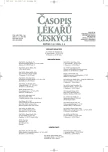-
Medical journals
- Career
Alcohol in the Elderly
Authors: K. Nešpor; E. Dragomirecká 1; L. Csémy 1
Authors‘ workplace: Psychiatrická léčebna Bohnice, Praha ; Psychiatrické centrum Praha 1
Published in: Čas. Lék. čes. 2005; 144: 325-326
Category: Special Articles
Overview
We summarize specific features of alcohol-related problems in elderly patients. About one third alcohol dependent elderly patients develop their alcohol dependence while already aged. It often happens after stressful life events such as retirement or bereavement. Such patients can be treated more easily and alcohol does not cause so many somatic complications in them when compared with those elderly who develop their dependence earlier. Alcohol-related problems in elderly patients should be recognized and treated as soon as possible. Cognitive–behavioural therapy, supportive group therapy with peers (especially in lonely patients), self-help groups, such as Alcoholics Anonymous, and family therapy are appropriate. Modern anticraving medication can be also effective but comparatively high price limits its use.
Key words:
alcohol, aging, psychotherapy.
Labels
Addictology Allergology and clinical immunology Angiology Audiology Clinical biochemistry Dermatology & STDs Paediatric gastroenterology Paediatric surgery Paediatric cardiology Paediatric neurology Paediatric ENT Paediatric psychiatry Paediatric rheumatology Diabetology Pharmacy Vascular surgery Pain management Dental Hygienist
Article was published inJournal of Czech Physicians

-
All articles in this issue
- Casuistry of the Family Members with Accumulation of Aortal Dissection
- Alcohol in the Elderly
- Recommendations for the Treatment of Tobacco Dependence
- Ischemia-Modified Albumin: New Marker of Myocardial Ischemia?
- Malignancies in Patients on Dialysis
- Pulmonary Resections and Prolonged Air Leak
- Long-lasting Survival of Patients with Implantable Cardioverter – Defibrillators Implanted from Secondary Preventive Reasons
- Distal Protection During Primary Angioplasty in Patients with Acute Myocardial Infarction
- Journal of Czech Physicians
- Journal archive
- Current issue
- Online only
- About the journal
Most read in this issue- Malignancies in Patients on Dialysis
- Alcohol in the Elderly
- Ischemia-Modified Albumin: New Marker of Myocardial Ischemia?
- Pulmonary Resections and Prolonged Air Leak
Login#ADS_BOTTOM_SCRIPTS#Forgotten passwordEnter the email address that you registered with. We will send you instructions on how to set a new password.
- Career

